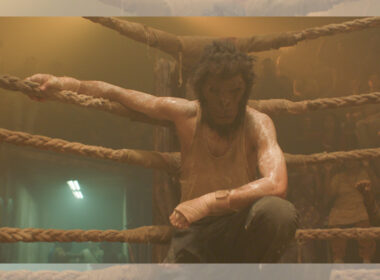Rating: ****
Are we humans supposed to indulge our humanity or rise above it? I had weird questions and thoughts when I left the screening of After Yang, a beautifully crafted conceptual sci-fi film that finds pleasure in asking questions that it is not interested in answering. Instead, it leaves us, confused sapient beings, to mull over them like wannabe philosophers. If ever there was a film made to make us all look intelligent, this is it – an indictment of our inherent curiosity. After Yang wants you to ponder about humanity with no restraints.
Set in a near-future where society is perfected to the point of aesthetic perception, a family purchases an android (in here, techno sapiens) to babysit their adopted Chinese daughter. Equipped with vast knowledge of Chinese culture, the android, Yang (Justin H. Min), malfunctions and breaks down one-day, but because they bought him refurbished, fixing him is not a cakewalk.
With his fittingly generic name, the father, Jack (Colin Farrell), promises the daughter, Mika (Malea Emma Tjandrawidjaja), he will do everything he can to fix Yang, even if he has to use the services of a clandestine, forbidden mechanic. He finds an illegal memory chip installed by the original manufacturers that gave the option for Yang to record small couple-of-seconds-long snippets of moments he deems crucial and relevant. What does that constitute for a synthetic machine? It just so happens to be the same as us – moments of happiness, sadness, unique revelation, a snapshot of a person we care about in a concert, a walk in the park.
Jack analyses these images with curiosity to try to understand this being that he always had seen as furniture could have developed feelings in a way. The twist is that most of these moments seem to be of Yang’s previous honours and include, possibly, a subject of Yang’s emotional affection, a young girl called Ada (Haley Lu Richardson).
There is a cold disconnection between people in this future, and I figured it is done on purpose. Beneath the calm and gorgeously curated décor lies a world that doesn’t understand nor connect with its own culture. Through the eyes of Yang, we see everyone consuming and contextualising but not relating to anything around them. The exception is Ada, ethereally listening to music in the middle of the crowd – the song is a gorgeous piece made for the 2001 Shunji Iwai masterpiece All About Lilly Chou-Chou (Japanese-American singer Mitski sings this version).
In one of my favourite scenes, Jack watches a particular memory of Yang where he questioned him about tea. An innocuous personality trait that ends up being the only thing he reveals about himself. Yang asks Jack why he likes tea so much, which the human doesn’t know. He knows the ceremony and the significance, with little depth. He references a documentary he saw where a “German man” (that happens to be filmmaker Werner Herzog) describes the pleasures of tea most poetically – Yang doesn’t understand that profundity because he’s a machine, Jack doesn’t understand it’s just an anecdote about his favourite hobby.
Kongonada, writing and directing his sophomore feature, uses his perfectionist style to his advantage. I don’t think he means this to be an ideal future or a boring dystopia. It’s just a future. Everything is clean and organised, taken from Uniqlo catalogues on sanitised surfaces. There are no poor people anywhere, which raises further questions. There are hints that something may have happened to China, and now refugee children need these androids to teach them the lost culture, and a little detail shows some internalised systemic Sinophobia.
During the brilliant opening credits, several families do a dance routine/game in front of their television, a strange tradition only they can understand. It’s not the perfect future; it shows us as willing participants of our apathy. By seeing the moments through Yang’s memories, Jack has a glimpse of lyricism and beauty that is probably eluding him. To the audience, that becomes the strength of this picture – Kongonada’s images are gorgeous and inviting and complemented perfectly by Ryuichi Sakamoto’s haunting score.
After Yang is the exact opposite of one of my current favourite films of the year – Daniels’s Everything Everywhere All At Once. One a maximalist ecstatic and bloated actionfest that wears its emotion on its sleeves and its determination to make you cry as soon as you let it. The other a lovely, minimalist, introspective emotionless cinematic thesis about what makes us human. They’re both terrific. What a wonderful world where these two can coexist.w




